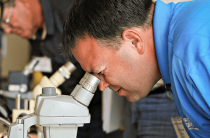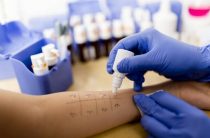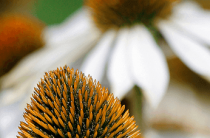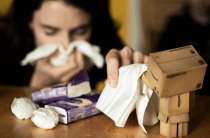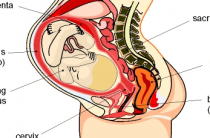With the beginning of spring, the time comes for the flowering of plants. A variety of flowers and trees delight us with a riot of colors. This period, this euphoria lasts quite a long time, until autumn. But with the advent of heat, many simply shudder in horror. After all, the time has come for seasonal allergies - allergies to flowering . This disease has other names: hay fever, pollen allergy, hay fever. It brings a lot of inconvenience and discomfort, not allowing a person to fully live and relax. Since the disease manifests itself in a mass of symptoms.
Flower allergy symptoms
It should be noted that the first symptoms of an allergy appear as a simple cold. It all starts with simple nasal congestion and watery eyes. Often these signs are regarded as a simple SARS, associating this with a change in weather and a weakened immune system. The next symptom of an allergy to flowering is a cough. In most cases, it is dry and comes in fits. Mostly at night. A call to the fact that you have an allergy is a rash on the skin, urticaria.
Patients with an allergy to flowering plants often suffer from shortness of breath. Frequent cases of asthma attacks. In such difficult cases, anaphylactic shock can occur. And it's good if you have time to provide first aid, and not all end in death. All these symptoms usually manifest themselves immediately after contact with pollen.
Causes of hay fever
This disease is a disease of the mucous membranes of the nose and eyes. They are hypersensitive to the pollen of certain plants and fungal spores. As a result of allergens, the mucous membranes are irritated and provoke rhinitis and conjunctivitis. A weak immune system is the root cause of allergic reactions. This is an inadequate reaction of the body to simple pollen, the immune system is not able to recognize harmful agents.
Twisted in the air, pollen settles everywhere: on our clothes, hair, face, skin. Therefore, it becomes impossible to avoid contact with her, since we cannot spend the entire spring-summer period locked up at home. The following plants are the cause of all suffering:
| April May | Birch, oak, poplar, walnut, alder, maple. |
| June July | Wheat, oats, barley, corn, rye, buckwheat, wheatgrass. |
| July-September | Wormwood, ambrosia, quinoa. |
Cross-reactions with many foods can also occur:
| birch pollen | Apple and alder pollen, birch sap, apples, plums, cherries, kiwi, carrots, celery, potatoes, almonds, hazelnuts. |
| Artemisia pollen | Citrus fruits, chicory, dill, coriander, fennel, cumin, celery, potatoes, vermouth, various balsamic infusions, honey. |
| Grass pollen | Any food grains, sorrel. |
Cough with pollen allergy
If you know that you are suffering from this ailment, then it would be appropriate to talk about the main symptom - an allergic cough. But if you are unsure about the nature of the cough, you should indicate the symptoms of an allergic cough:
| suddenness | As a rule, it appears unexpectedly, for no reason. Without the manifestation of other cold symptoms (fever, body aches, fatigue). |
| The nature of the manifestation | Occurs spontaneously. |
| Time | Coughing fits occur at night, may be accompanied by suffocation. |
| Dryness | There is no sputum, as a result of which, after coughing, relief does not occur. |
| Other manifestations | Allergic cough is combined with sore throat, lacrimation, runny nose. |
| Breath | There are difficulties with breathing, shortness of breath. |
Allergic cough occurs after allergens enter the respiratory tract of a person. Through the nasal mucosa, the allergen enters the larynx. The body's defense mechanism is activated. Cough itself is not very dangerous, but if it is accompanied by swelling of the nasopharyngeal mucosa, this can lead to complications and other diseases, such as bronchial asthma. There are the following characteristic antecedent symptoms of an allergic cough:
- when an irritant enters the mucous membranes, sneezing begins;
- runny nose;
- the cough is aggravated by contact with pollen, by smoking, and by too dry air.
Treatment of allergies to flowering and cough
You need to know that you need not to relieve the symptoms of the disease, but to treat the allergy directly. Thank God that now there is a wide variety of all kinds of medications that will help you come to a healthy life. But, nevertheless, at the first stages of treatment, the symptoms are removed. Do not delay with an allergic cough. It is he who can develop into a chronic form.
The first condition for getting rid of an allergy to pollen is to exclude any contact with a pest plant. You should consult a doctor. The allergist will prescribe a series of tests to determine the cause of the disease. In most cases, a skin test and a blood test will be sufficient. And based on your history, the doctor will prescribe a complex of antihistamines to relieve allergy symptoms. Relatively recently, a method of getting rid of an allergy to flowering, called elimination therapy, has been developed. Its essence lies in the complete removal of allergens from the body and minimizing possible contact with it.
And yet, many doctors prefer the medical method. There are such drugs for allergies: antihistamines, glucocorticosteroids, vasoconstrictors. Antihistamines, in turn, are divided into first and second generation drugs.
First generation drugs:
| Tavegil | Eliminates such allergic manifestations as rhinitis, cough, redness of the eyes, conjunctivitis, itching. Children are allowed from the age of one year. |
| Suprastin | It is prescribed for seasonal allergies, effectively relieves all its symptoms. Allowed for children from 2 months. |
| Peritol | Removes hives. Effective for pollinosis. Allowed for children from 6 months. |
| Fenkarol | Relieves allergic rhinitis, eliminates allergic cough. |
| Pipolfen | Effective in the fight against allergic manifestations. Allowed for children from 1 year. |
Second generation drugs:
| Astemisan | It fights quite well with hay fever, removing its symptoms. It is prescribed for bronchial asthma. Does not cause drowsiness. |
| Claritin | It is prescribed for allergic diseases of the upper respiratory tract. Relieves itching and burning of the skin. Not addictive. Has no sedative effect. |
| Zyrtec | It has proven itself as an antipruritic and antiallergic agent. Removes swelling of the nasal mucosa. |
| Terfenadine | Well treats allergic rhinitis, conjunctivitis, dermatitis, urticaria and many other manifestations of the disease. |
| ebastine | Great for seasonal and year-round allergies. |
Glucocorticosteroid drugs normalize cell membranes. Restore the immune system. There are short, medium and long action. Short-acting drugs include hydrocortisone. To the middle - prednisolone, and to the long - Dexamethasone. The drugs in this group have an anti-inflammatory effect. Enhance the effect of the use of antihistamines. Quite effectively relieve allergic reactions.
Nasal and eye drops should be attributed to vasoconstrictor drugs for flowering allergies. Their choice is quite large, and you can easily pick up any drops and sprays for your symptoms, illness and age. The following have proven themselves well: Vibrocil, Otrivin, Brizolin, Nazivin, Naphthyzinum.
In severe cases of allergic rhinitis, nasal drops and antibiotics are used. They are quite safe, not addictive. A prominent representative is Polydex drops. This remedy will effectively relieve rhinitis due to its composition, which includes hormonal, antibacterial and vasoconstrictive components. But these drops are contraindicated in viral diseases of the upper respiratory tract, during pregnancy and lactation, and in children under three years of age.
Allergic cough treatment
To rid yourself of an allergic cough, you should act in a complex way. Firstly, contacts with the allergen (plant pollen) are excluded. Secondly, antihistamines are required. And the third point is to increase immunity. We should not forget about the prevention of the disease.
When taking antihistamines, there is every chance to effectively and permanently get rid of coughing and choking. If the patient suffers from nocturnal attacks, he should take the following medicines: Codelac, Tedein, Libeksin. These drugs eliminate sore throat, soothe it. At night, you can use cough sprays - Ingalipt, Kameton. The convenient form of these drugs allows you to immediately remove irritation of the throat, unlike tablets, the action of which occurs 20-30 minutes after ingestion. All medications should be prescribed only by an allergist, taking into account all your symptoms and the cause of the allergy.
Traditional medicine in the fight against allergic cough
To get rid of a cough caused by hay fever, traditional medicine offers many recipes.
- Drink decoctions of chamomile daily instead of tea;
- Eat as much calcium as possible;
- Well-known from childhood inhalations in pairs of potatoes. It takes about 15 minutes to breathe over a pot of boiled potatoes. Thus, we release the airways and normalize, soothe the mucous membranes of the nasopharynx;
- Prepare milk-onion broth. To do this, boil five peeled onions in two glasses of milk. Cool this decoction and take throughout the day.
The following decoctions will help you get rid of an allergic cough:
| A decoction of the husk | Pour onion peel with one liter of water. Boil until half of the water is gone. Drink 3 times a day with honey. |
| Chamomile | Just boil dry chamomile flowers and take the infusion every day if your allergy is not caused by chamomile or birch blossoms. |
| Decoction of black pepper | For one glass of boiling water, you will need 2 tablespoons of honey and 1 teaspoon of black pepper. After infusion, take small sips. |
| banana broth | Make a puree of two bananas and pour boiling water over it. Excellent remedy for taking at night - relieves coughing fits. |
| Decoction with lemon | Squeeze juice from boiled lemon. mix with 2 tsp glycerin. pour it all over with honey. Take 1 tsp per day. |
Prevention of allergy to flowering
The most effective means for the prevention of pollinosis will be departure to another climatic zone at the time of flowering.
Great help trips to the sea. If this is not possible, then try not to walk during the day and in calm weather. Walk only in the evening and after rain. Try to open windows and doors less often. If such a need exists, then cover the window with a wet sheet. Be sure to get an air conditioner or air purifier. But do not forget to regularly wash the filters in them. Wet cleaning should be carried out daily. When you get home, immediately take off your street clothes, wash your face thoroughly, rinse your nose and gargle.
To prevent allergic cough, follow the above principles. Also try to minimize contact with animals, because they are carriers of pollen and dust. If possible, get rid of woolen carpets in the house, which accumulate pollen brought from the street. Wash your throat every time before going to bed.


